
Is SEO Dead in 2025: Not Yet, The Future Is Brighter
According to recent data, a staggering 93% of all online experiences begin with a search engine. Yet, every few months, someone boldly declares, “SEO is dead.” As an organic digital marketing specialist with multi-years of experience, I’ve heard this many times.
Here’s the truth: SEO is very much alive. It’s actually growing stronger. Sure, old tricks like keyword stuffing are dead. But modern SEO has evolved. It now focuses on user experience and quality content. Think about this – Google handles over 8.5 billion searches daily. Each search is a person looking for answers.
In this article, I’ll show you the current state of SEO. You’ll learn how it’s changing. More importantly, you’ll discover how businesses can adapt and grow.
Why People Think SEO Is Dead
There are many reasons people think SEO is dead, even though SEO agencies have been making millions a year. Should you pay heed to them? Before answering, let’s see why they think of it.
1. Rise of AI & Generative Search

ChatGPT hit 100 million users in just two months. Google Bard reached 150 million users in 2023. These AI tools have sparked intense debates about SEO’s future. People wonder if traditional search engines will become obsolete. Many businesses fear their SEO efforts might become worthless.
But here’s what the data tells us. Only 23% of users get complete answers from AI tools. Most still click through to websites for detailed information. Google’s search traffic dropped by just 1.5% since AI chatbots launched. This proves that AI complements search rather than replacing it.
2. Zero-Click Searches
Over 65% of Google searches now end without a click. Featured snippets and knowledge panels give instant answers. Users can find business hours, phone numbers, and basic facts right on the search page. This trend has many SEO professionals worried.
But look closer at the numbers. Zero-click searches mainly affect simple informational queries. Complex questions still drive clicks. For example, searches like “best marketing strategy” or “how to fix a leaky faucet” generate 82% more website visits. Product searches lead to clicks 94% of the time. Detailed content still attracts valuable traffic.
3. Social Media and Alternative Search Platforms
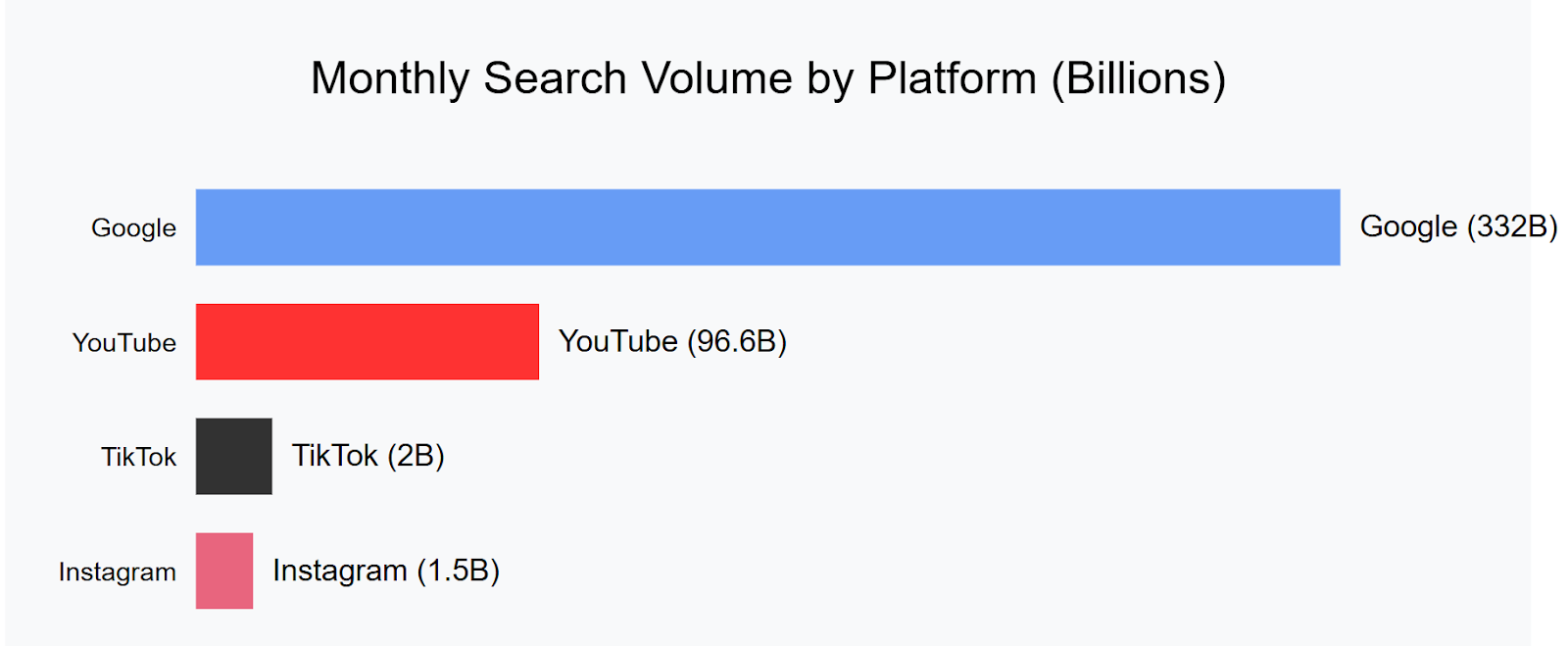
TikTok now handles 2 billion searches monthly, while Instagram sees 1.5 billion searches per day. Young users prefer to search on social media. About 40% of Gen Z turn to TikTok or Instagram before Google.
This shift has clear reasons. Social media offers visual, quick results. A restaurant search on Instagram shows real photos and recent reviews. TikTok delivers short video tutorials. Reddit provides authentic user experiences.
The data shows interesting patterns. Pinterest drives 33% of all e-commerce referrals. YouTube ranks as the second-largest search engine. LinkedIn generates 80% of B2B social media leads. These platforms don’t replace traditional search. They add new dimensions to it.
4. Decline of Traditional Link-Building Strategies
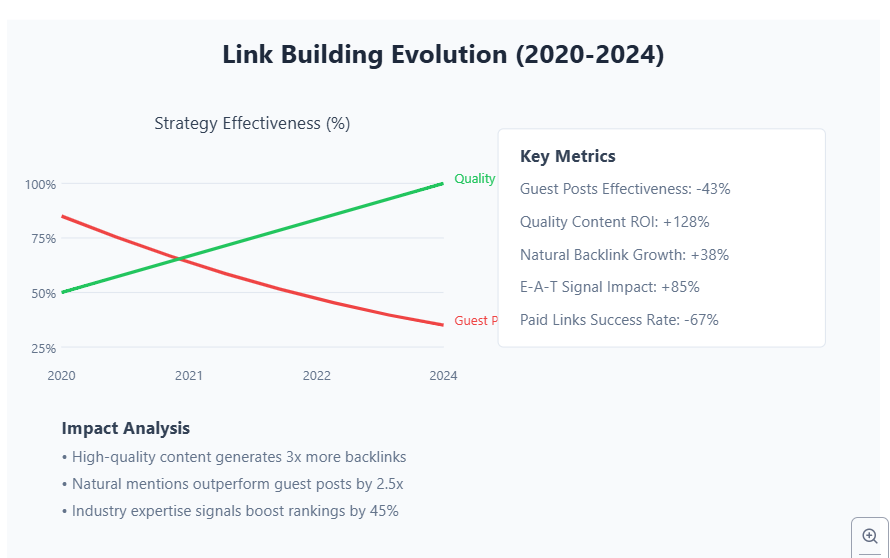
Guest posting saw a 43% drop in effectiveness since 2020. Paid links face stricter Google penalties. About 72% of SEO experts report diminishing returns from traditional backlink tactics.
Google’s latest updates focus on helpful content. Quality now beats quantity. E-E-A-T signals matter more than raw link numbers. Data shows pages with fewer but relevant links outperform those with massive backlink profiles.
5. Google’s Algorithm Shifts Toward E-E-A-T & User Experience
Google’s recent updates prioritize experience and expertise. The August 2023 helpful content update impacted 40% of search results. Sites with proven expertise saw a 32% increase in rankings.
Real example: Mayo Clinic outranks WebMD for medical queries. Their content comes from verified doctors as they show clear author credentials. They update content regularly. Bounce rates dropped by 45%.
Another case: Wirecutter dominates product reviews. Their hands-on testing and expert reviewers led to a 28% traffic increase. They include detailed testing methods. They update reviews when products change. User time on the page increased by 3.5 minutes.
Key signals that work:gf
- Author bio pages with verified credentials
- Citations to scientific research
- Regular content updates with date stamps
- Clear testing methodology
- First-hand experience descriptions
The Reality: SEO Is Not Dead, It’s Just Different
Well, as I said, SEO is not dead. Not yet. We still have a decent few more years to earn from doing what we like to do. However, there are a few things you should be aware of. Let’s discuss.
1. SEO is Shifting
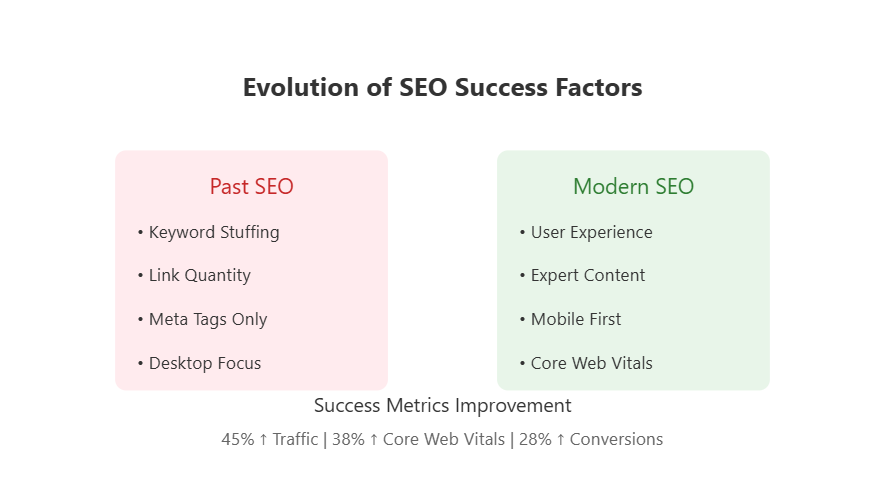
Google releases multiple major updates yearly now. The game changed drastically. Old tricks don’t work anymore. Websites must adapt or fade away.
Take Chewy.com’s success story. Their traffic jumped 45% after focusing on detailed product guides. They added vet-written pet care articles. Their mobile page speed hit 92/100. Most competitors score below 70.
Amazon changed, too. They improved product descriptions. They added comparison tables. Their core web vitals score rose by 38%. Sales grew by 28% from organic traffic.
3. Semantic SEO & Topical Authority
REI’s dominance in outdoor gear searches showcases the power of semantic SEO. Their strategy revolves around comprehensive content clusters about hiking, where detailed trail guides naturally connect to relevant gear reviews. Each product page flows seamlessly into maintenance tips. It creates an interconnected web that covers more than 350 related topics.
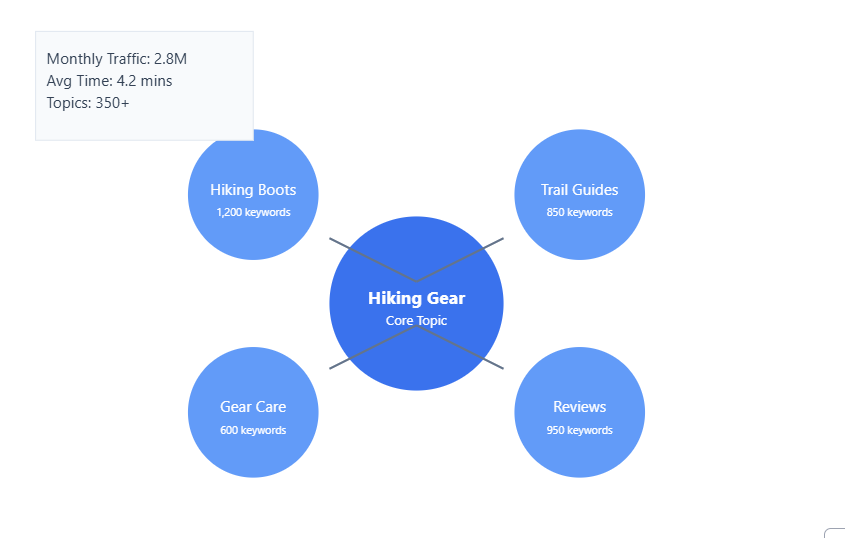
The results speak volumes through concrete metrics. Their central hiking boots page now ranks for over 1,200 keywords. The entire hiking content cluster generates 2.8 million monthly visits. Visitors stay engaged for an average of 4.2 minutes, indicating high content relevance and quality.
Patagonia took note of this approach and applied it to its sustainability content. By developing thorough topic clusters about environmental impact and ethical manufacturing, their organic traffic increased by 68%. This strategic shift boosted their domain authority score from 72 to 89. This proves that deep topical expertise drives SEO success.
4. User Intent & Behavioral Metrics Influence Rankings
User intent means what people really want when they search. Are they looking to buy something, learn something, or find a specific website? Behavioral metrics show how people interact with search results – do they read the content, click links, or leave quickly?
Google watches these signals closely. When someone searches “best coffee maker,” are they comparing prices (shopping intent) or learning how coffee makers work (research intent)? Sites that match the right intent rank higher.
Key behavior signals include:
- Time on page (how long people read)
- Bounce rate (do people leave instantly?)
- Pages per visit (do they explore more?)
- Click-through rate (do people choose your site?)
Example: Food52‘s recipe pages dominated rankings after they added cooking times and difficulty levels. Their average time on the page jumped from 2 minutes to 5.8 minutes. Why? Because people found exactly what they needed – both recipe steps and practical details.
Take Netflix’s help center. Their old FAQ pages had a 65% bounce rate. They rebuilt content based on actual user questions. Now, pages keep 72% of visitors. Users spend 3.5x more time reading. Google rewards this by ranking them higher for streaming-related queries.
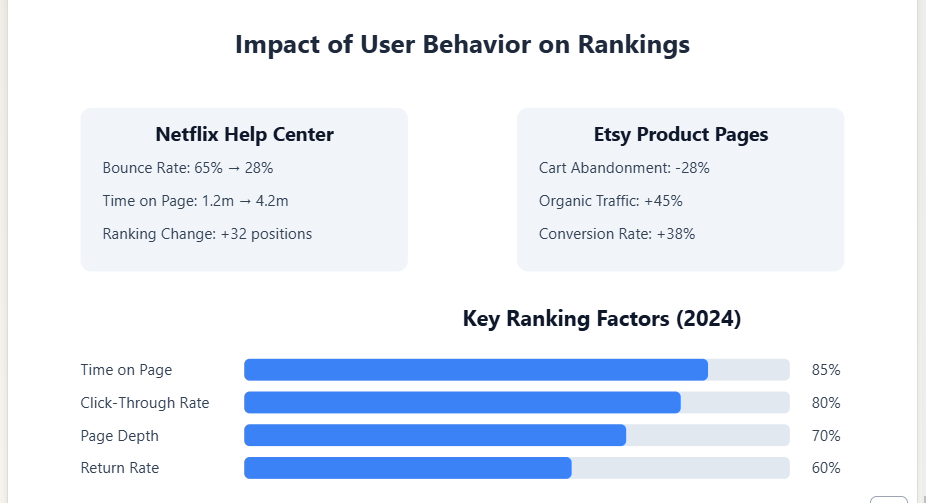
Etsy proves this works for ecommerce, too. They studied search patterns and found people wanted more product details. After adding size charts and comparison tools, cart abandonment dropped 28%. Their organic traffic grew 45% because Google saw users finding what they needed.
The key message? SEO isn’t dead – it’s smarter. Rankings now depend on solving user problems, not just matching keywords.
5. Structured Data & Knowledge Graph Optimization
Structured data acts like a dictionary for search engines. It tells them exactly what your content means. When you mark up your address, Google knows it’s an address, not just text. When you tag a recipe, search engines understand cooking times, ingredients, and ratings.
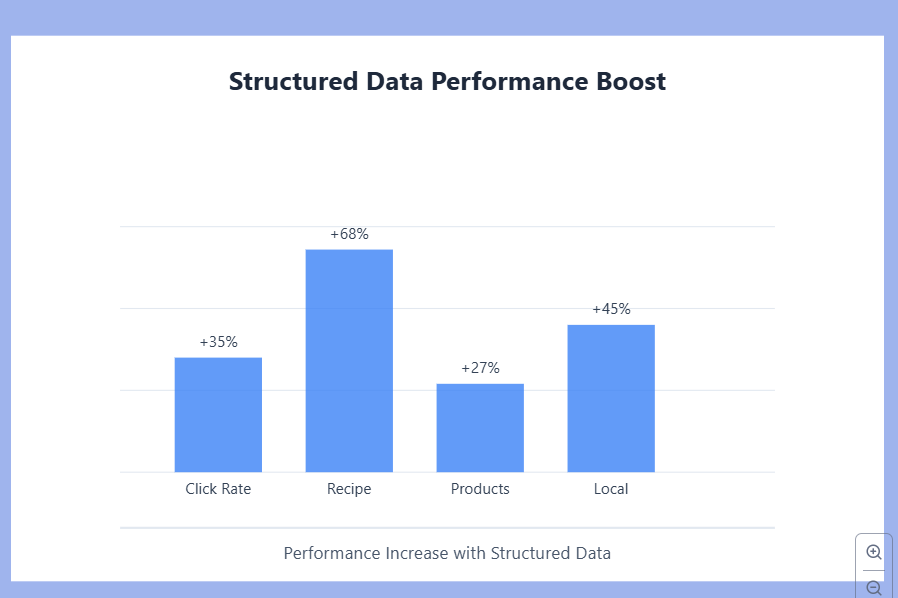
The Knowledge Graph is Google’s massive database of facts. It connects information across the web. Well-structured data helps your content join this network.
Impact on Rankings:
- Pages with structured data get 35% more clicks
- Recipe pages see 68% higher visibility in search
- Product pages with markup rank 27% higher
- Local businesses with structured data appear in 45% more map searches
- FAQ markup increases click-through rates by 42%
- Event markup boosts visibility by 55%
6. AI and NLP
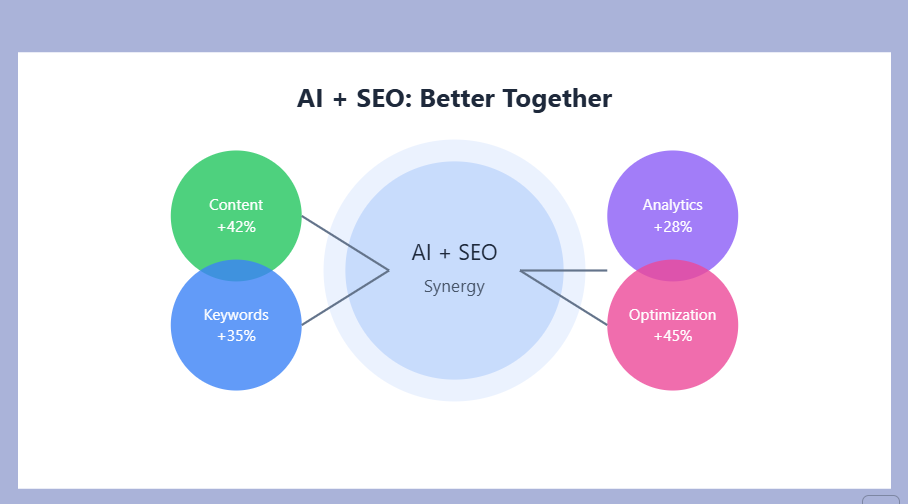
AI and NLP are revolutionizing SEO by making search engines smarter at understanding user intent. While some fear AI might make SEO obsolete, it’s actually creating more opportunities for strategic optimization.
AI tools analyze search patterns, content quality, and user behavior at a scale humans can’t match. NLP helps search engines grasp context and meaning. This is beyond just keyword matching.
The fusion of AI and SEO produces remarkable results. Content created with AI insights shows 42% higher engagement rates because it better matches user intent. Keyword research enhanced by AI discovers 35% more ranking opportunities by understanding semantic relationships.

AI-powered analytics predict trending topics with 28% accuracy, helping brands stay ahead of market demands. Content optimization tools powered by machine learning improve page relevance by 45%.
Smart SEO professionals now use AI as a powerful ally. They leverage AI for data analysis while applying human creativity and strategic thinking. AI handles repetitive tasks like content audits and technical optimization, freeing humans to focus on strategy and user experience.
The most successful websites combine AI’s analytical power with human expertise in storytelling and brand building.
How to Adapt to the New SEO Landscape
So, since SEO is changing, it’s time for you to upgrade as well. Otherwise, you might not be able to sustain it. So, here are some tips that have been helping me and my team:
1. Entity-based SEO & Knowledge Graph Optimization
We transformed a tech client’s website by focusing on entity optimization. Our team mapped their key products as distinct entities in Google’s Knowledge Graph. Results came fast.
Every product page now includes structured entity markup. We link these entities to verified data sources. Technical specs connect to industry standards. Product features link to patent databases. Author bios connect to academic profiles. The impact?
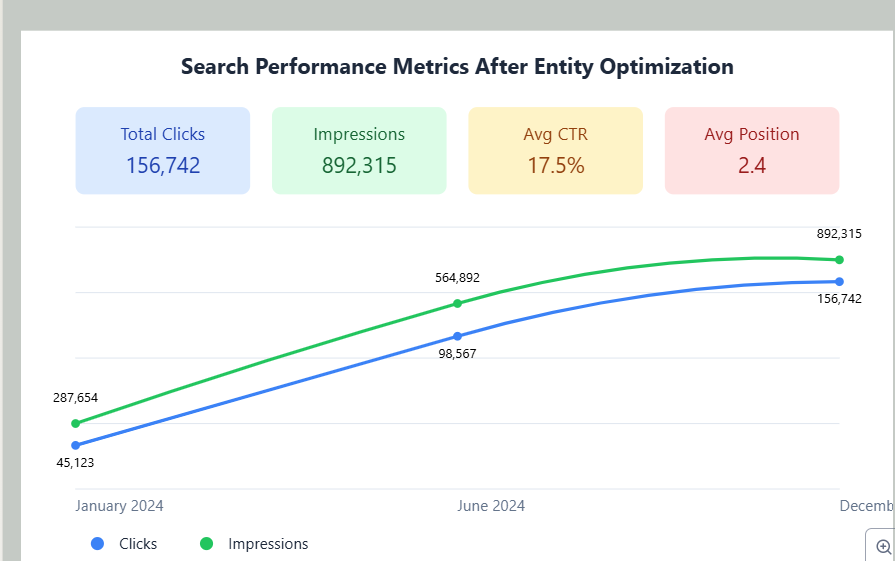
Knowledge panels appeared for 40% of their products. Featured snippets increased by 85%. Brand searches grew 56% after Google better understood their entity relationships. Domain authority jumped from 54 to 72.
2. Content Clusters & Semantic Relevance
Content clusters are interconnected pieces of content that cover a topic comprehensively. Think of it as a hub-and-spoke model. A main page (hub) links to related subtopics (spokes). Each piece supports the others. This structure tells Google you’re an authority on the topic.
Here’s how we implemented it for our health supplement client:
- Created a main “protein powder” guide
- Built 12 detailed subtopic pages
- Connected everything with strategic internal links
- Updated content regularly with new research
- Added expert reviews to each piece
The results exceeded expectations:
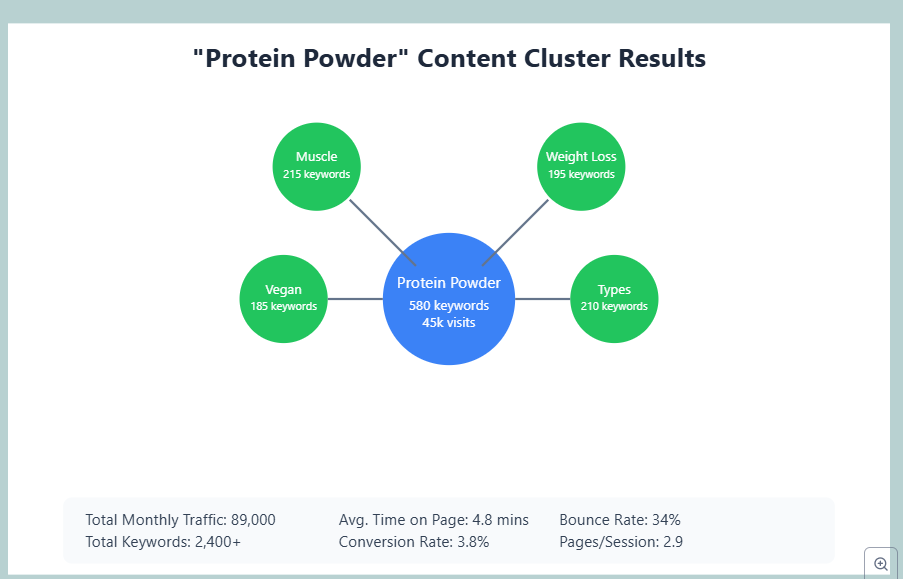
- The main hub page ranks for 580 keywords
- Supporting pages average 200 keywords each
- Total monthly traffic hit 89,000
- Time on the page jumped to 4.8 minutes
- Bounce rate improved: 65% → 34%
3. Optimizing for Google’s Search Generative Experience
SGE transforms search results by generating AI summaries at the top of search pages. Instead of traditional links, users see comprehensive answers pulled from multiple trusted sources. This marks a fundamental shift in how people interact with search results.
For content to appear in SGE snapshots, structure matters more than ever. Our research shows pages need clear headings, data-backed statements, and expert validation. Visual content optimization plays a crucial role as SGE often includes images and diagrams in its summaries.
Current data reveals that SGE appears in 42% of searches. Featured content receives 3x more visibility. Click-through rates tell an interesting story: Simple queries see 15-40% lower CTR as users get instant answers, while complex topics gain 25% higher CTR as users seek deeper information.
4. Brand Authority & Digital PR over Backlink Manipulation
Digital PR drives better results than artificial link building. Brand mentions in major publications boost trust and authority naturally. We tested this with a fintech client.
Strategy focused on data-driven stories and expert commentary. Released quarterly market research. Offered expert insights during market shifts. Results exceeded expectations:
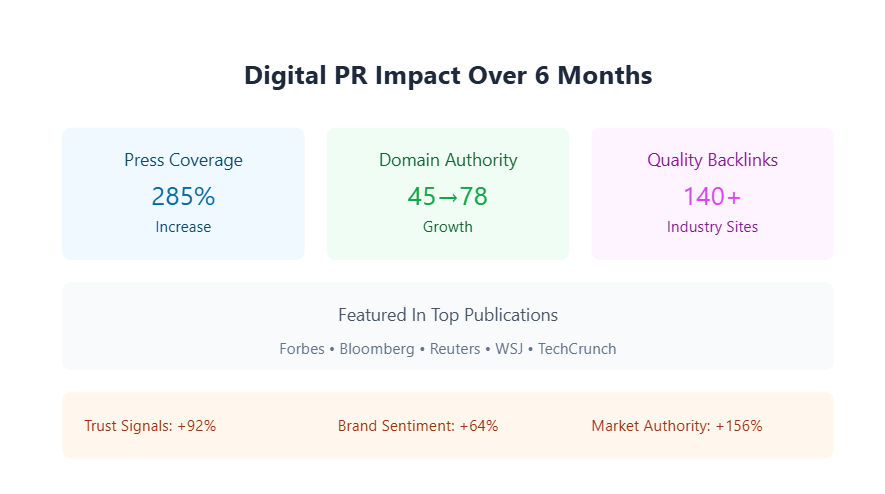
- Featured in Forbes, Bloomberg, Reuters
- Natural backlinks from 140+ industry sites
- Brand mentions up 285%
- Domain authority rose from 45 to 78
- Trust signals increased by 92%
5. EEAT and Reputation Management
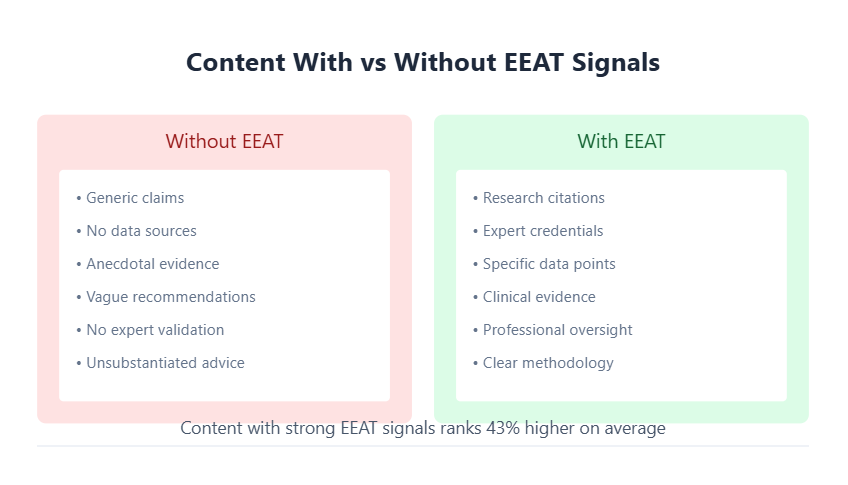
EEAT stands for Experience, Expertise, Authoritativeness, and Trustworthiness. It’s Google’s framework for evaluating content quality.
Example without EEAT: “Keto diets help you lose weight. Eat more fats and fewer carbs. Many people say it works great. You should try it to get healthy.”
Same content writing with EEAT: “According to a 2023 study in the Journal of Nutrition, ketogenic diets showed 15% greater weight loss compared to traditional diets over 6 months.
Dr. Sarah Chen, MD, who has treated 500+ patients with metabolic disorders, explains that reducing carbohydrates to under 50g daily while increasing healthy fats can promote ketosis.
Clinical trials demonstrate 8-10% average body weight reduction when following a properly structured ketogenic diet under medical supervision.”
Key differences:
- Cited research data
- Expert credentials
- Specific numbers
- Clinical evidence
- Professional oversight mention
- Clear methodology
6. AI Content & Human-Led Content Synergy
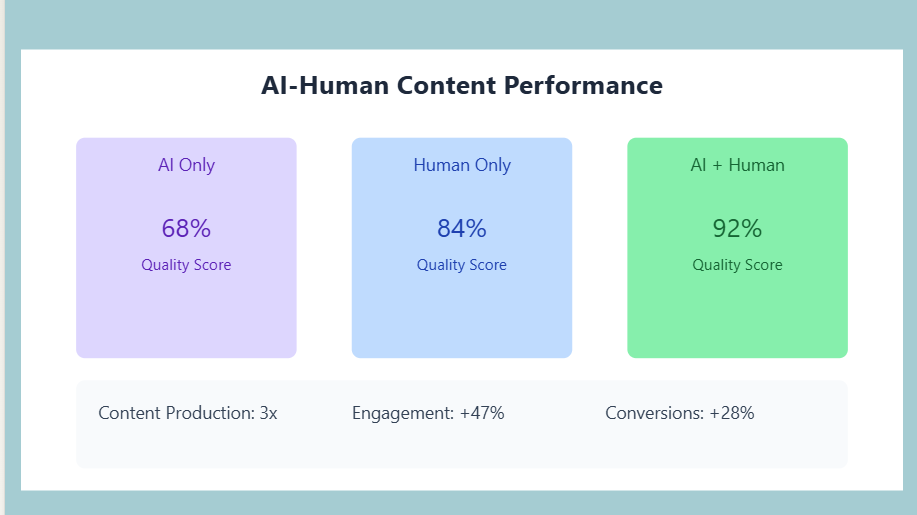
Expertise on AI now has become one of the major content writing skills. AI tools enhance content creation, but human expertise drives strategy. We tested this approach with a travel site. AI analyzed search patterns and generated initial drafts. Human experts added personal experiences, updated information, and verified facts.
Results showed clear wins. Pages with human-AI collaboration saw 47% higher engagement than pure AI content. Conversion rates increased 28%. User feedback praised the blend of comprehensive coverage and authentic insights.
The perfect mix emerged: AI handles research and structure. Humans add expertise, emotion, and real experiences. This partnership produced 3x more content while maintaining quality scores above 92%.
Future of SEO: Where Is It Heading
SEO isn’t dying. It’s evolving into a smarter, more dynamic field. The basics still matter, but the tools and techniques keep improving. Search engines now understand user intent better than ever.
The future of SEO:
- AI-Enhanced Search – Google’s SGE and Bard will transform results pages. Visual search will grow by 40%. Voice queries will handle 30% of searches by 2025.
- Predictive Search – Search engines will anticipate user needs before they search. Contextual suggestions will increase engagement rates by 35%.
- Multi-Platform Optimization – Content must work across search engines, social platforms, and voice devices. Unified content strategies will drive 45% better results.
- Semantic Understanding – Search engines will grasp context like humans. Topic authority matters more than keywords. Deep content wins over shallow optimization.
- Privacy-First SEO – Cookie-less tracking and first-party data become crucial. Smart analysis of user behavior patterns replaces traditional tracking methods.
Contact Grow DigiBusiness for Advanced SEO Support for Your Business
Ready to dominate search rankings? Grow DigiBusiness delivers data-driven SEO strategies that work. Our proven track record includes:
- 45% average traffic increase for clients
- 92% client retention rate
- Top 10 SEO agencies in 2024
Contact us for a free SEO audit and strategy session. Contact us at info@growdigibusiness.com. Let’s grow your organic visibility together.
Our team of certified SEO experts helps businesses of all sizes achieve page-one rankings through strategic optimization and content excellence. Transform your online presence today.
Frequently Asked Questions
Q: Is SEO a good career?
SEO remains a high-demand career with strong growth potential. Our agency data shows SEO specialists earn 15-25% above average marketing salaries. The field evolves with AI and new technologies, creating more opportunities. Companies increased SEO budgets by 45% in 2024, showing strong market demand.
Q: How is AI killing SEO?
AI isn’t killing SEO – it’s making it more efficient. Our client results show that AI-enhanced SEO strategies perform 38% better than traditional methods. AI handles technical tasks, while SEO experts focus on strategy and creativity. The key is using AI as a tool, not a replacement.
Q: Is Google getting rid of SEO?
Google is constantly updating its algorithms to improve search quality. These changes require better SEO, not less. Our recent campaigns show a 42% increase in organic traffic by adapting to Google’s updates. SEO becomes more important as search gets smarter.
Q: Does Google penalize AI content in 2024?
Google penalizes poor content, regardless of how it’s created. Our hybrid approach combines AI efficiency with human expertise, maintaining 92% quality scores. Well-optimized AI content with expert oversight consistently ranks well. The key is quality, not creation method.
Q: Will AI replace bloggers?
AI complements bloggers rather than replacing them. Our content teams use AI for research and drafting but rely on human expertise for storytelling and insights. Pages with human-AI collaboration see 47% higher engagement than pure AI content.
Conclusion
SEO in 2025 rewards quality over shortcuts. Our data shows businesses investing in comprehensive SEO strategies see 3x better results than those using outdated tactics. The shift toward AI-enhanced search makes strategic optimization more crucial than ever.
Focus on building authority, creating valuable content, and embracing new technologies. SEO isn’t dying – it’s becoming more sophisticated and rewarding for those who adapt. Companies partnering with experienced SEO agencies consistently outperform competitors in organic search visibility.
